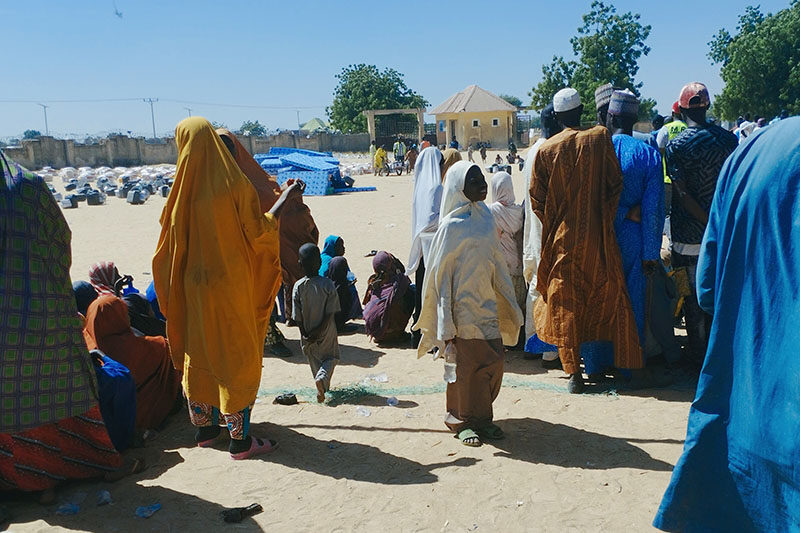This year’s theme of World Refugee Day, commemorated around the globe on June 20, was “Hope Away from Home” – but the more than 20,000 Nigerian refugees in Diffa in the Niger Republic are not feeling very hopeful.
Most of them fled to Niger about nine years ago because of the insecurity they faced on a daily basis as insurgents carried out persistent deadly attacks on Malam Fatori in the Abadam Local Government Area of Borno State in Nigeria’s northeast.
Malam Fatori is a remote community near the border with Niger that was overrun by insurgents in 2014.
The refugees in Diffa – as well as those in Bosso and Tumur in Niger – have good reason for having little to no hope of returning to their home country any time soon.
In October 2021, Borno State governor Babagana Umara Zulum visited the refugees in Niger to assess their situation. He told them they would be back in their ancestral community on November 27 of that year.
It did not happen.
In April this year, then-president Muhammadu Buhari approved the release of ₦15 billion for the immediate repatriation of Nigerians taking refuge in the neighbouring countries of Niger, Cameroon and Chad.
Civil society groups said they were extremely grateful because many refugees had been living in the neighbouring countries for eight or more years and they desperately wanted to return to their homeland.
Zulum again gave the refugees in Niger hope when he announced in April that they would be home by May.
This did not happen.
Zulum said in March that refugees in Chad would be repatriated at the end of the holy month of Ramadan.
That did not happen.
RNI spoke to refugees in Niger to get their take on their situation. All of them said they had no humanitarian aid and described their living conditions as being a “crisis”. They lacked basic social amenities such as food, clean and safe drinking water, shelters, healthcare services and schools for their children to be educated.
They said there was only one working borehole for more than 20,000 refugees.
Their children were going to Sangaya or Almajiri schools and were not receiving a “proper modern or Western” education.
There was no medical facility in the camp and sometimes they had to leave the camp and pay the little money they had to get urgent treatment.
Men struggled to get food to eat. They searched for firewood in the nearby forests, which they sold to get money to feed their families. Some women had to sell fried soya bean cake and fried yam to earn money. Many refugees depended solely on begging to feed their families.
The refugees in Diffa have spent almost nine years in refugee camps. All confirmed that the reason they left Malam Fatori was because of the insurgency.
Baba Gana Bulama Nganzar, a Nigerian refugee in Diffa, said that, because of the humanitarian crisis, they were eager to return home. Apart from the lack of basic amenities, they were unable to do business or farm so they had no means of making a living.
“There are more than 20,000 refugees here. We get no humanitarian aid or assistance from either the Nigerian or Nigerien governments and there are no non-governmental organisations [NGOs] providing help.”
He urged the Nigerian government to urgently facilitate their safe return to their hometowns.
Qasim Malam Fatori, also taking refuge in the camp in Diffa, said that they had been there for almost nine years.
“We do not have adequate food and water; we lack shelters; there are no modern schools to educate our children; and we do not have healthcare services.
“Many people are suffering from killer diseases, such as cancer, and we have no access to health facilities for proper medical treatment. Our children are not being educated. I am pleading with both the federal and Borno State governments to fulfil the promises they made to rebuild our destroyed homes and to return us home safely. All we want to do is to go back home so that we can continue with our businesses and farming activities as we did before we fled.”
Abdullahi Suleiman, director of operations of the Borno State Emergency Management Agency (SEMA), told RNI that the state government had already set up a committee to facilitate the safe return of Nigerian refugees from Niger, Chad and Cameroon.
He said about 3,000 Nigerian refugees, who were taking refuge in Cameroon, had already been repatriated. They were resettled in Banki town in the Bama Local Government Area of Borno State.
The government was focusing on how to repatriate the refugees in Diffa, he said, adding that it would be “very soon”.
Suleiman said the state government was working with the National Commission for Refugees, Migrants and Internally Displaced Persons to ensure the safe return of all the refugees in the neighbouring countries.
Zulum, after his re-election as governor, pledged in his inaugural speech on May 29 to rebuild destroyed houses and other critical infrastructures, such as schools, hospitals and markets, to pave the way for the safe return of refugees originally from Borno State.
- World Refugee Day is designated by the United Nations to honour refugees around the globe. The day is commemorated annually on June 20 to celebrate the strength and courage of people who have been forced to flee their home country to escape conflict or persecution.
The day is a reminder of the challenges faced by millions of people forced to flee their homes and countries around the world because of conflicts and insecurity.
It creates awareness and advocates for the rights of refugees. It is a day to build empathy and understanding for the plight of refugees and to recognise their resilience in rebuilding their lives.
SHETTIMA LAWAN MONGUNO






